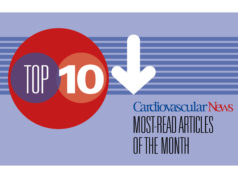 Top stories for September included more highlights from the European Society of Cardiology’s 2021 congress (ESC 2021, 27–30 August, virtual), an in-depth look at renal denervation, and a career-spanning interview with the renowned interventional cardiologist Christoph Naber.
Top stories for September included more highlights from the European Society of Cardiology’s 2021 congress (ESC 2021, 27–30 August, virtual), an in-depth look at renal denervation, and a career-spanning interview with the renowned interventional cardiologist Christoph Naber.
- No-touch CABG technique “reduces risk of vein graft occlusion” after 12 months
When a modified surgical technique was used to gently remove sections of leg veins used in coronary artery bypass surgery, the grafts were less likely to become blocked and fewer people had a recurrence of heart-related chest pain, according to new research published in Circulation.
- STOPDAPT-2 ACS does not support clopidogrel monotherapy one-month after ACS
Findings of the STOPDAPT-2 ACS trial presented during a hot line session at the European Society of Cardiology’s 2021 congress (ESC 2021, 27–30 August, virtual), do not support the use of one month of dual antiplatelet therapy (DAPT) in acute coronary syndrome (ACS) patients undergoing stent implantation.
- Ultrasound guidance “should be routine” for transfemoral TAVI access
Ultrasound-guided transfemoral transcatheter aortic valve implantation (TAVI) is associated with a significant reduction in the risk of access site vascular and bleeding complications, compared to a fluoroscopy-guided strategy, a systematic review and meta-analysis comparing the two approaches has concluded.
- Systematic pressure wire assessment has no additional benefit at diagnostic angiography
Adding systematic fractional flow reserve (FFR) assessment to coronary angiography does not reduce costs or improve quality of life in patients undergoing diagnosis for chest pain, nor does it reduce major adverse cardiac events or revascularisation rates. That is the finding of late-breaking research presented at the European Society of Cardiology’s 2021 congress (ESC 2021, 27–30 August, virtual).
- VIDEO: Digital app speeds up time to STEMI care
“During a heart attack time is myocardium,” says Annapoorna Kini (New York, USA) discussing the development of a digital app—STEMIcathAID—designed to speed up the treatment of ST-segment elevation myocardial infarction (STEMI) patients within the Mount Sinai Health System. Kini tells Cardiovascular News how the app aims to provide a seamless platform for communication between Emergency Department physicians and the cath lab.
- TCT 2021: Late-breaking trials programme announced
The Cardiovascular Research Foundation (CRF) has announced 22 late-breaking trial and science presentations that will be reported at the Transcatheter Cardiovascular Tecnhologies annual meeting (TCT 2021, 4–6 November, Orlando USA and virtual).
- Renal denervation: The most advanced and efficacious interventional approach to treat hypertension
Following the release of the European Society of Hypertension’s (ESH’s) updated position paper on renal denervation Konstantinos Tsioufis, professor of Cardiology at the University of Athens, Athens, Greece and immediate past president of ESH, discusses the use of renal denervation in the treatment of hypertension, considers the latest evidence in favour of the approach, and outlines the questions still to be answered.
- Registry data show comparable outcomes for bicuspid and tricuspid TAVI in low-risk patients
Patients at low surgical risk who had undergone transcatheter aortic valve implantation (TAVI) for bicuspid aortic stenosis had no significant difference in mortality or stroke at 30 days or one year compared to those who had undergone TAVI for tricuspid aortic stenosis.
- FDA approves Abbott’s Epic Plus tissue valves for mitral and aortic valve replacement
Abbott has announced that the US Food and Drug Administration (FDA) has approved the company’s Epic Plus and Epic Plus Supra Stented Tissue Valves for aortic or mitral valve disease.
- PROFILE: Christoph Naber
Christoph Naber (Essen, Germany) talks to Cardiovascular News about his career in interventional cardiology. Known for his work in the Stent–Save a Life campaign, he has also served as a course director for AsiaPCR, and co-director for the EuroPCR and PCR London Valves events, and more recently has helped to found the We CARE campaign, in response to the COVID-19 pandemic.









